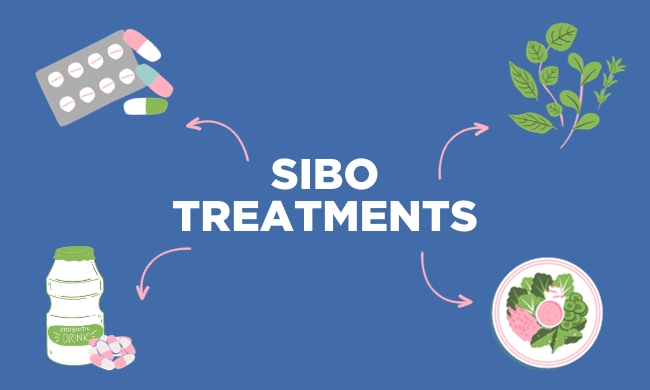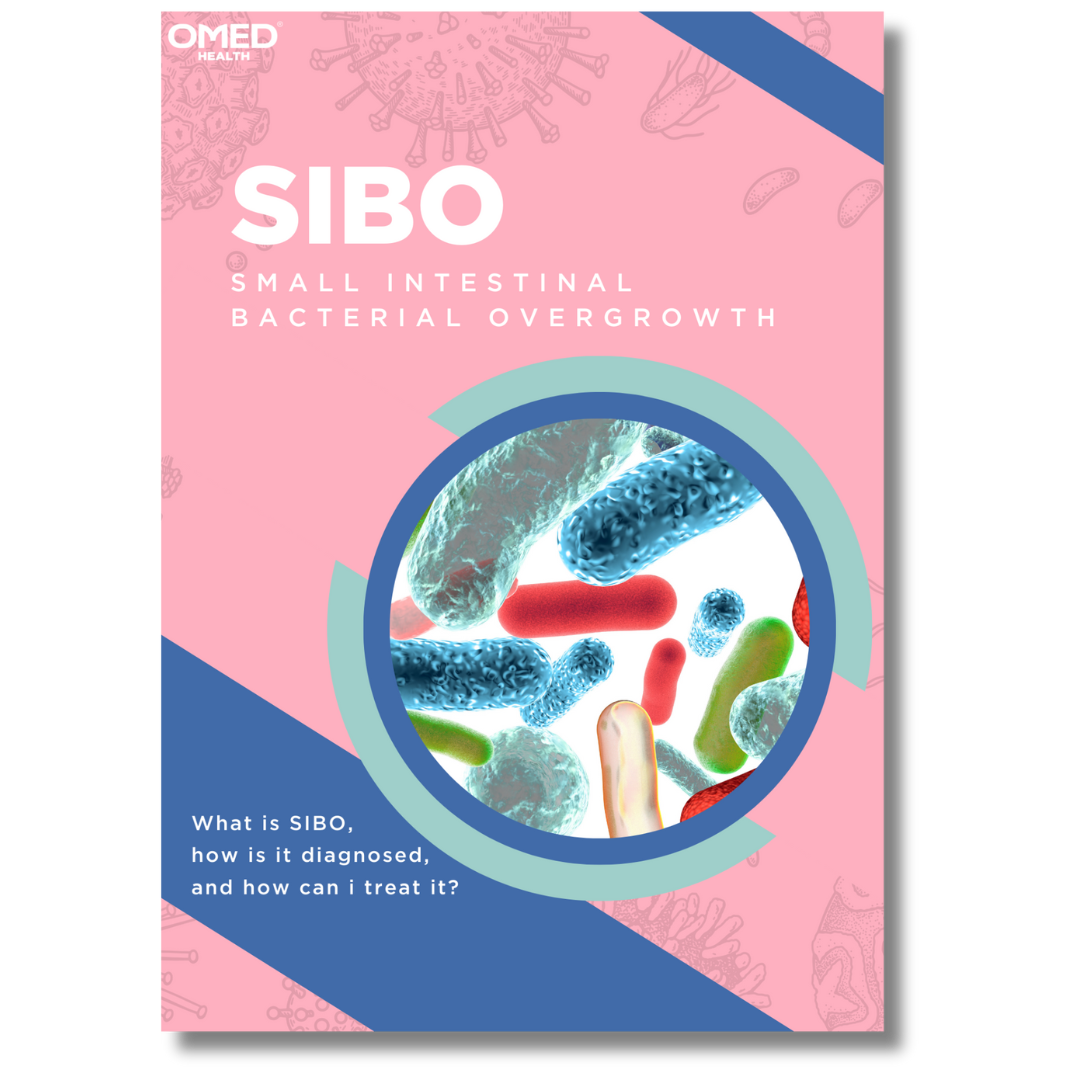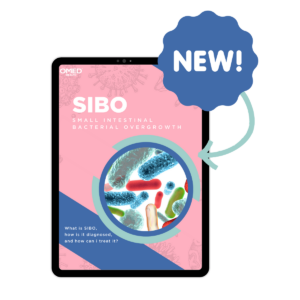When you receive a diagnosis of small intestinal bacterial overgrowth (SIBO) it can be overwhelming when thinking about how to treat SIBO. To learn more about what SIBO is, including information about symptoms and diagnosis, head over to the first blog in our SIBO series. In this article, we will discuss a range of SIBO treatment options, including conventional antibiotics, probiotics, dietary therapy, and herbal remedies for SIBO.
How do you treat SIBO?
SIBO treatment with antibiotics
No one should have to live with daily digestive discomfort, so understanding how to treat SIBO and finding the right SIBO therapy for you is essential. At the moment, rifaximin, metronidazole, and ciprofloxacin are the go-to antibiotics for SIBO therapy, aiming to reduce the bacterial population in the small intestine to resolve symptoms. Antibiotics can be an effective SIBO treatment – a review of clinical trials reported that rifaximin treatment improved symptoms in 33-92% of patients, and eradicated SIBO in up to 84% of IBS patients (1).
Although antibiotics treat bacterial overgrowth, they don’t get to the root of the problem and treat the underlying causes of SIBO, meaning that it can sometimes re-occur. One study showed that up to 44% of patients tested positive again for it nine months after SIBO antibiotics (2) Antibiotics can also kill beneficial bacteria in your gut which might give rise to other digestive issues like colitis and diarrhea, and long-term antibiotic use can sometimes lead to antibiotic resistance in bacteria. This is bad news and means that the same SIBO antibiotics might not work for you again in the future! With these points in mind, alternative SIBO remedies, alongside antibiotics are being explored.
SIBO Herbal Treatment
You might be most familiar with herbs and spices as a tasty addition to your meals, but did you know that garlic, cinnamon, thyme, cloves, and rosemary have been used by humans for generations to alleviate symptoms and treat disease? (3)
In fact, one scientific study found a herbal remedy for SIBO can be just as effective as rifaximin when it comes to treatment (4). Patients with SIBO symptoms and a positive lactulose breath test chose either a four-week course of rifaximin or SIBO herbal treatment (combining a selection of herbs including thyme, tarragon, mugwort, oregano, sage, lemon balm, and barberry). After four weeks, patients underwent another lactulose breath test to see if the treatment had worked.
After treatment with rifaximin 34% of patients had a negative breath test, indicating that the antibiotics had successfully treated SIBO. In comparison, 46% of patients who chose the herbal therapy option had a negative breath test. Neither group experienced serious side effects from their respective treatments (4).
These results highlight that SIBO herbal treatment can be just as effective as conventional SIBO antibiotics. This provides an option that may be used to support antibiotic SIBO therapy or even offered as an alternative under the guidance of a clinician. However, follow-up studies are needed to make confident conclusions, as other factors that can impact SIBO (e.g., stress, diet, underlying conditions) were not accounted for, and the mixture of herbs given to patients was not standardized.
Probiotics for SIBO treatment
Probiotics are bacteria that can be beneficial to health – you may have seen them sold as supplements or as an ingredient in yogurt drinks. Whilst taking more bacteria to help treat SIBO might seem counterintuitive, the idea behind probiotic therapy is that the probiotic bacteria replace SIBO bacteria and help to restore a healthy bacterial population in the small intestine.
A recent review of SIBO treatments found five studies that gave probiotics to SIBO patients, and in four of the five studies, improvements in SIBO were reported in 24 to 93% of patients (5). One study highlighted that the use of the saccharomyces boulardii for SIBO patients was most effective at eradicating the condition when combined with antibiotics – SIBO was eradicated in 55% of patients who took both probiotics and antibiotics, compared to 25% of antibiotic-only patients, and 33% of probiotic-only patients (6).
The studies used different probiotics, length of treatment time, number of treatment cycles, type of patients, and the comparison treatment (e.g., antibiotics, placebo) (5), which makes drawing any strong conclusions difficult. Whilst it’s hard to say for certain that probiotics can treat SIBO, the results from these studies indicate that probiotics might be beneficial for some SIBO patients.
Dietary therapy to treat SIBO
Many people with gastrointestinal conditions follow restrictive diets in an effort to manage symptoms, which can have negative impacts on quality of life (7) and lead to lower intakes of important micronutrients like calcium, zinc, and vitamin A (8). One study reported that 80% of IBS patients had a negative lactulose breath test 15 days after following a powdered meal replacement program and 66% of patients with SIBO reported improvements in digestive symptoms (9).
Although nutritionally complete, powdered meal replacement diets can be challenging to follow – 11% of patients in this study dropped out before the end because they couldn’t tolerate the diet. Additionally, a recent review exploring the role of diet in SIBO concluded that many studies don’t provide strong enough evidence that diet makes a difference (10).
What’s the verdict on alternative therapies for SIBO?
Although some of the evidence for probiotics and herbal therapy seems promising, it’s important to remember that these studies were conducted on a wide range of SIBO patients, including people with other conditions (e.g., cancer, liver disease). The causes and symptoms of SIBO can vary from person to person, so what works for someone else might not have the same effects for you. If you are interested in alternative SIBO therapy it’s important that you discuss this with your clinician as they are best placed to guide you through a suitable treatment pathway.
How can OMED Health support your digestive health journey?
If you are living with uncomfortable digestive symptoms, taking a simple at-home breath test can help to identify whether you have SIBO, and therefore allow for the appropriate treatment for SIBO. You can learn more about the home tests we offer for SIBO and food intolerances here. You can also now join the waitlist to have priority access to our OMED Health Breath Analyzer device and App which can help to monitor if your SIBO treatment is working.

Resources for healthcare professionals
Do you work with patients experiencing digestive discomfort or SIBO symptoms? Learn more about how we can support you and your patients here.
References
- Pimentel, M. Review of rifaximin as a treatment for SIBO and IBS. Expert Opinion on Investigational Drugs. 2009. 18(3):349-358. DOI: 1517/13543780902780175.
- Lauritano et al. Small intestinal bacterial overgrowth recurrence after antibiotic therapy. The American Journal of Gastroenterology. 2008. 103(8):2031-5. DOI: 1111/j.1572-0241.2008.02030.x.
- Lai PK & Roy J. Antimicrobial and chemoprotective properties of herbs and spices. Current Medicinal Chemistry. 2004. 11(11):1451-60. DOI: 2174/0929867043365107
- Chedid et al. Herbal therapy is equivalent to Rifaximin for the treatment of small intestinal bacterial overgrowth. Global Advances in Health and Medicine. 2014. 3(3):16-24. DOI: 7453/gahmj.2014.019
- Nickles et al. Alternative treatment approaches to small intestinal bacterial overgrowth: a systematic review. Journal of Alternative and Complementary Medicine. 2021. 27(2):108-119. DOI: 1089/acm.2020.0275
- García-Collinot et al. Effectiveness of Saccharomyces boulardii and metronidazole for small intestinal bacterial overgrowth in systemic sclerosis. Digestive Diseases and Sciences. 2020. 65(4):1134-1143. DOI: 1007/s10620-019-05830-0
- Stocks NP, Gonzalez-Chica D, Hay, P. Impact of gastrointestinal conditions, restrictive diets and mental health on health-related quality of life: cross-sectional population-based study in Australia. 2019. BMJ Open. 9(6):e036035. DOI: 1136/bmjopen-2018-026035.
- Lim HS, Kim SK, Hong SJ. Food elimination diet and nutritional deficiency in patients with inflammatory bowel disease. 2018. Clinical Nutrition Research. 7(1):48-55. DOI: 7762/cnr.2017.7.1.48
- Pimentel et al. A 14-day elemental diet is highly effective in normalizing the lactulose breath test. Digestive Diseases and Sciences. 2004. 49(1):73-77. DOI: 1023/b:ddas.0000011605.43979.e1
- Souza C, Rocha R, Cotrim HP. Diet and intestinal bacterial overgrowth: is there evidence? World Journal of Clinical Cases. 2022. 10(15):4713-4716. DOI: 12996/wjcc.v10.i15.4713


